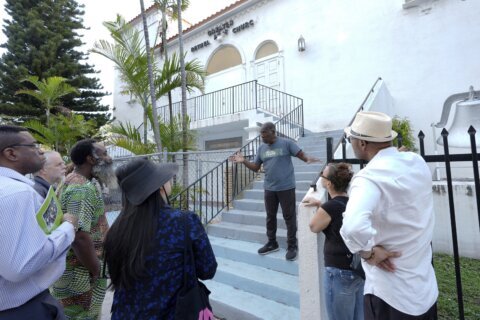INDIANAPOLIS (AP) — An Ohio nonprofit that provides off-site Bible instruction to public school students during classroom hours says it will triple its programs in Indiana this fall after new legislation forced school districts to comply.
To participating families, nondenominational LifeWise Academy programs supplement religious instruction. But critics in Indiana worry the programs spend public school resources on religion, proselytize to students of other faiths and remove children from class in a state already struggling with literacy.
LifeWise founder and CEO Joel Penton told The Associated Press that many parents want religious instruction to be part of their children’s education.
“Values of faith and the Bible are absolutely central to many families,” Penton said. “And so they want to demonstrate to their children that it is central to their lives.”
Public schools cannot promote any religion under the First Amendment, but a 1952 Supreme Court ruling centered on New York schools cleared the way for programs like LifeWise. Individual places of worship often work with schools to host programs off campus, and they are not regulated in some states.
LifeWise officials addressed the Oklahoma and Ohio legislatures in support of laws that would require schools to cooperate with off-site religious programs, Penton said, and Oklahoma’s Republican governor signed one such bill into law Wednesday.
Similar bills have been introduced in Ohio, Nebraska, Georgia and Mississippi this year, according to an AP analysis of Plural, a legislative tracking database.
LifeWise programs will be available at over 520 locations in 23 states next school year, up from 331 in 13 states this year, and about 31,000 students attend LifeWise programs in the U.S., Penton said.
Penton wants LifeWise to be available to “50 million public school students nationwide,” he said.
In Indiana, Republican state Rep. Kendell Culp introduced the legislation requiring principals to allow students to attend release-time religious education after a rural school stopped cooperating with LifeWise. The bill was signed into law in March and subsequently 45 Indiana schools will work with the company this fall, triple the number from last year.
LifeWise Academy, based in Hilliard, Ohio, is funded by donors, including more than $13 million in contributions from July 2022 to June 2023, according to its latest federal report.
The curriculum was developed in conjunction with the Gospel Project, a Bible study plan produced by an entity of the Southern Baptist Convention, Penton said. Instructors are provided with guidance on how to respond to difficult questions, including about the afterlife and sex. LifeWise opposes same-sex marriage, as well as transgender and gender-fluid identities.
“Our guide helps classroom educators address these questions with compassion, humility and respect,” Penton said in a statement.
Chris Paulsen, CEO of LGBTQ+ rights advocacy group Indiana Youth Group, voiced concern that children can receive Christian religious instruction during the school day “yet no one can talk about queer families.” Indiana bans “human sexuality” instruction in schools through third grade.
LifeWise staff and volunteers either bus or drive students from school to the program sites, or use spaces near schools and supervise children walking there.
Indiana law and the 1952 Supreme Court ruling say no public funds can be spent on supplemental religious education, but critics worry schools expend public resources on scheduling and getting children to and from the programs.
“It just puts another burden on the teachers,” said Michelle Carrera, a high school English teacher in Culp’s district.
Democratic lawmakers derided the new law when literacy scores and attendance are down and said it violates the separation of church and state guaranteed in the First Amendment.
“Saying that a religious organization can mandate scheduling at a school strikes me as a fundamental violation of that important American principle,” said Indiana House Education Committee member Ed DeLaney, a Democrat.
Jennifer Matthias, on Fort Wayne Community Schools’ board of trustees, opposes a new program in her district, especially because recent Republican-led legislation establishes stronger literacy requirements for elementary students.
“How can removing students from the academic day benefit them?” she said.
Backers argue the LifeWise model allows low-income students who cannot afford after-school programs to receive supplemental religious instruction. Culp said the Indiana law gives parents a greater say in their children’s education.
“This is really more about parental rights,” he said.
Christa Sullinger, 46, began sending her 10-year-old son to LifeWise in Garrett, Indiana, last year. With baseball activities on Sundays, the family sometimes misses church and LifeWise fills in the gaps.
“What a great way to solidify our faith,” Sullinger said.
LifeWise says it does not teach programs during classes such as math or reading, but rather during lunch, recess or electives including library, art or gym. Children can attend for up to two hours a week under Indiana law.
The West Central School Corporation in rural Pulaski County, about 100 miles (160 kilometers) north of Indianapolis, said 64% of its 345 elementary school students attended LifeWise during library this past school year.
West Central School Corporation Superintendent Cathy Rowe said there may be students who feel left out if they don’t attend LifeWise, but that is up to the parents.
“It’s been very well supported in our community,” she said.
The district was often at the center of discussion during the passage of Indiana’s bill. Opponents said if only a handful of children are left at school, they may feel pressure to join or alienated if they are not religiously affiliated or practice another faith.
Some children promote the program to their classmates of their own volition, Penton said.
“We’re grateful when students find joy in our program and spread the word,” he said.
Demrie Alonzo, a tutor of English as a second language in Fredericktown, Ohio, said she saw one LifeWise representative tell one of her third-grade students, who is Hindu, that they could teach her about Jesus. An investigation ensued, resulting in school superintendent Gary Chapman reminding Fredericktown Local School District and LifeWise officials to refrain from soliciting student participation during school hours.
Children from “a diverse array of backgrounds” participate, Penton said.
“I felt it was extremely inappropriate,” Alonzo said.
___
Associated Press researcher Rhonda Shafner contributed from New York.
Copyright © 2024 The Associated Press. All rights reserved. This material may not be published, broadcast, written or redistributed.






